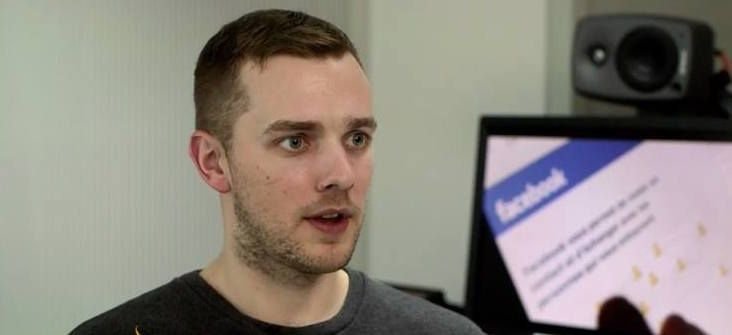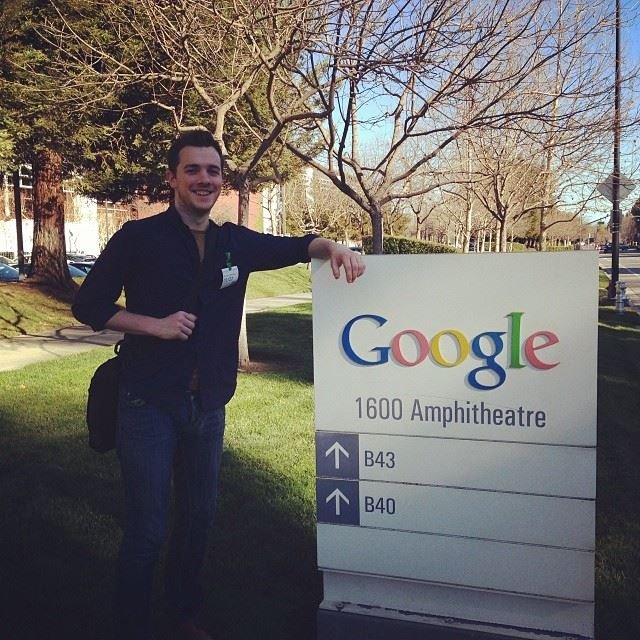"I think Steemit needs to build a movement here. That means advocacy. That’s the single biggest way to grow: make it easy to grow. " says Richard Millington, the founder of FeverBee who has helped more than 250 companies grow some of the world's largest online communities.

In today's "20 questions" interview, Richard explains the importance of community, how online communities differ from in-person communities, and how to deal with toxic individuals who negatively impact the community experience for others.
But, perhaps most importantly, I took this opportunity to ask Richard a few questions that specifically apply to Steemit, such as: How do monetary incentives affect community building? How important are in-person meet-ups (such as SteemFest) for growing an online community? And what are the top things Steemit should focus on if it wants to grow its presence online?
Richard has dug deep and provided thoughtful responses to each of the questions above. I hope you all take away as much from this interview as I did.
20 questions with Richard Millington

1 - How would you describe yourself in one sentence?
Richard - Founder of FeverBee, author of Buzzing Communities, and a huge believer in the importance of building valuable communities for some organizations.
2 - For those who aren't familiar with it, what is "FeverBee?"
Richard - FeverBee provides consultancy, training, and technology to help companies make their community a success. Our focus is on using social psychology, your existing data, and techniques from persuasion to increase membership, engagement, and make the community as valuable as it can be.
3 - What does it mean to have a "sense of community?"
Richard - A sense of community goes beyond what members do and focuses upon how members feel. Do people feel a part of the community? People might click, like, share, and comment, but that doesn’t mean they are truly a part of your community. The only people really in the community are those who believe they are.
A sense of community is highly predictive of retention, levels of participation, and the valuable outputs of community like knowledge sharing, loyalty, and increase in sales.
4 - How do online communities differ from in-person communities?
Richard - In online communities you trade depth for accessibility. Online you can’t see what someone wears, how they speak, their body language, and personal comfort with one another. You can’t easily see the unity of the group. All of these things help us form judgements and make assumptions about people. We can easily distinguish who the top people are and who we want to help.
The problem is building a community offline can be difficult. Community organizers have often been knocking on doors and trying to persuade people to stop watching Lost and come to a gloomy community hall to discuss picking up litter and tackling crime. It’s a hard sell for an apathetic crowd.
Online communities provide accessibility (you don’t even need to be together at the same time), but they come with the catch in depth. Many (like customer support communities) don’t have the same sense of community. But the people that do arrive are usually there because they care about the topic - at least for now. So the challenge is building that community with people who are interested in the topic but don’t have the same investment in it as they would their local area/club etc.

5 - How do most organizations fail when it comes to attempting to build a sense of community?
Richard - In short, everything.
They do almost everything wrong. They make the community too broad and open to as many people as possible. But a sense of community requires a strong sense of membership. That means perceived similarity to one another.
The enthusiasm from the community manager usually isn’t big enough and they fail to provide members with the ability to influence the group, which is critical. They try to control things too tightly. They often avoid discussing topics that people feel most strongly about, but that’s exactly what builds a strong emotional connection with members. They also fail to build a shared sense of history.
You can look all these elements up here.
6 - From a social psychology point of view, why is it important for us to be part of a community?
Richard - This is more sociology and social psychology.
Online communities provide us with a place to explore, influence our surroundings, emotional support and a sense of belonging. To many, they provide a place where we’re not alone anymore. That’s incredibly powerful.
Robert Putnam, in Bowling Alone, noted how the social capital created by communities helped members become healthier, happier, and wealthier. One of the strongest predictors of happiness is our attachment to strong, vibrant, communities.
7 - How should a community deal with an individual who brings a toxic attitude to the group?
Richard - The common answer would be to talk to the person, understand them in a phone call or face-to-face situation. It’s harder for people to continue to be toxic then.
My answer is usually just to remove the person. There are plenty of stories of people whose attitudes have been changed by a simple chat, but the time it takes to do that with each person is better spent on the people who are participating well. You could do amazing things for them.
So remove toxic members fast.
8 - You've spoken about the importance of community rituals. What is the most unique community ritual you've come across?
Richard - I think ‘unique’ is the wrong approach. Boys of the Satere-Mawa tribe in Brazil, for example, must go through a ritual of wearing gloves of bullet ants (the insect with the most painful sting in the world) 20 times to become accepted as a man. I’m sure it works, but it doesn’t translate well to other cultures. The North Africa Masai tribe circumcises boys aged 12 to 24 (without anaesthetic) during which time they can’t even wince in pain without dishonour.
For online community professionals, I’d recommend trying something far simpler (and less painful). Have your members share what they’re working on each week, their challenge each week, welcome newcomers to the group, ask people to share their funniest or worst mistakes in the field. The younger men of the group will thank you for it!

9 - How has social media impacted communication within communities?
Richard - Social media has taken many of the discussions from chat rooms and forums into a domain in which the company has far less control. It has devastated many communities but created equally as many. Communities today are less about being siloed within a single platform and more about engaging with audiences across many platforms.
The bigger concern is whether a dominant community platform such as Facebook, LinkedIn, Reddit, StackExchange etc...might become the ‘de-facto’ place for communities. If you spend all your time there, why not have your community there as well?
It’s very risky to build a community on a platform you don’t own or control. If Facebook suddenly begins charging you to reach group members, that’s a big problem.
10 - Are sub-communities helpful or harmful when it comes to the success of a larger community?
Richard - They’re critical to sustain a strong sense of community.
11 - Steemit is a blockchain database that supports community building and social interaction with cryptocurrency rewards. In your opinion, how can monetary incentives affect community building?
Richard - Monetary incentives are traditionally a bad thing. People stop participating for intrinsic reasons and start participating for extrinsic rewards. But the rewards usually aren’t sustainable. Yet with a big enough ‘mass’ of members it could definitely work.
12 - What is the number one thing a website like Steemit should focus on if it wants to expand as an online community?
Richard - Call us! :-)
Seriously, a few things…
First, fix the registration / login process, which seems broken as I reply to this (and has been for a while).
Second, decide what it wants its members to be. Are they readers, sharers, teachers, advocates? What do they want their members to become? I think Steemit needs to build a movement here. That means advocacy. That’s the single biggest way to grow: make it easy to grow.
Third, embrace the meta. People want to know what’s going on at Steemit. You need more transparency to attract more advocates. People love the idea, but now they want to feel part of the movement. They need to know more about Steemit and the meta-news for that to work.
Fourth, build profiles of each group they want in the community. Understand what each profile needs from the community? What do newcomers need and want? How about veterans? How about lurkers ? Do a lot of interviews and ethnographic research to see exactly where people get stuck, how they share it, and what you can do with it.
13 - How important is it for online communities to periodically put together events or meet-ups to encourage in-person interaction?
Richard - Depends on the community, but for the most part it’s pretty useful to be able to do it. Be careful about excluding people who can’t attend, though. Often it’s only a small % of members who attend and the rest who get spammed with content about it.

14 - What led you down this career path? Have you always been passionate about building communities?
Richard - I became involved in building communities in the video gaming sector some 16 or so years ago. I loved the nature of online communities and feeling a part of something special - even if I was just sitting in my bedroom at the time.
After graduating, I did an internship with a guy named Seth Godin in New York, and then began doing more and more work building online communities. It’s been a fun ride.
15 - Where do you see yourself 10 years from now?
Richard - No idea (truly).
16 - As a blogger, where do you find the time to publish posts on–almost–a daily basis?
Richard - It’s about priorities. The blog is a priority for me. It’s more important than client work, admin work, and promotional work. The blog is as much for me as it’s about the people that read it. It forces me to consider new ideas, reflect upon what is and isn’t working, and think logically through some issues.
It also helps that we’re exposed to a huge amount of people in the community space. I just came back from a trip to San Francisco where I interviewed around 20 community professionals to get a sense of who they are and what they are struggling with.
17 - Who inspires you?
Richard - I still find Seth Godin’s work inspirational, Ramit Sethi’s work quite logical, and authors such as Eric Ries to be quite tactical. I’m very inspired by the work in the community space by Phoebe Venkaat, Allison Leahy, Rachel Happe and others in building internal support and frameworks for communities.
18 - You get to have dinner with three people, living or dead. Who are you eating with?
Richard - My wife and my (sadly deceased) grandparents. I’d love those guys to have met.

19 - What is one community you're not currently part of, but would like to be?
Richard - I honestly can’t think of one, I’m privileged to be in every community I’d like to be today.
20 - What is one thing very few people know about you?
Richard - I’ve met Paul McCartney and Angelina Jolie, if that’s worth anything?
My thank you goes out to Richard for giving all of us some key takeaways, which I believe can help grow Steemit's online community and sub-communities.
As always, thanks to all of you for taking the time to read.
Who would you like to see me throw 20 questions at? Drop me a comment below and I'll work on setting up the interview.
If you like what you read, be sure to follow my blog!

Previous "20 questions" interviews:
20 questions
20 questions
20 questions
20 questions
20 questions
20 questions
20 questions
20 questions
20 questions
20 questions
20 questions with Janina Storace
20 questions
20 questions
20 questions with Scott Young
20 questions with Jesse Heiman
20 questions
20 questions with Chelsea Dinsmore
20 questions
20 questions with Ludvig Sunström
20 questions with Kyle Eschenroeder
20 questions
20 questions with Tim Brownson
20 questions with Sean Ogle
20 questions with Henri Junttila
20 questions with Hal Johnson
20 questions with Farnoosh Brock
20 questions with Manny Kess
20 questions with John Goehrke
20 questions with Sunny Lenarduzzi
20 questions with The Cranky Flier - Brett Snyder
20 questions with Shawn Murphy
20 questions with Leo Babauta
20 questions with Jacob Staudenmaier
20 questions with Steve Scott
20 questions with Stefan Hyttfors
20 questions with Zachery Ty Bryan
20 questions with Ryan Lancaster
 with @heiditravels with @katecloud with @manthostsakirid with @blockchaingirl with @piedpiper with @stellabelle with @budgetbucketlist with @rogerkver with @allasyummyfood with @the-alien with @mrs.steemit with @andrarchy with @dragosroua with @sirwinchester with @roelandp
with @heiditravels with @katecloud with @manthostsakirid with @blockchaingirl with @piedpiper with @stellabelle with @budgetbucketlist with @rogerkver with @allasyummyfood with @the-alien with @mrs.steemit with @andrarchy with @dragosroua with @sirwinchester with @roelandp
Great interview and truly coming from someone who has been dealing with online communities since forever. In fact, I've been feeling that lately - out of sync with the Steemit "movement". Maybe it's a good thing since the community is taking on a life of its own, but I think there still needs to be some core story / movement that makes it spark. Many good points to consider here, even for my own account :)
Thanks for suggesting I reach out to Richard! This particular line was a powerful one for me:
"The only people really in the community are those who believe they are."
I think there are a ton of takeaways in Richard's answers.
Yeah great quote there, and very true. In fact, I think one of the best ways is to talk about steem / steemit in posts and discussions lol even though that's somewhat frowned upon. I guess some of us just want to feel like we're somewhat involved with the platform's development.
I totally agree on the advocacy part. I mean Facebook started out as a particular niche and close community: Harvard students. Only once the community garner sufficient support then can it grow and extend its reach. I feel that Steemit community cater largely to people interested in cryptocurrencies and in order to grow beyond just the crypto space, we definitely need to bring on people with interesting stories to share. Example: music, art, scientific, etc.
Focusing solely on financial reward will kill any movement in the long run. So, spread the word and steem on!
I really enjoyed the interview mate...I just found your page so Ill have to catch up on the other interviews.
^^NEW FOLLOWER^^
Cheers! I hope you enjoy :)
great interview
Thanks so much :)
The community of Steem is getting bigger. Maybe we should somehow divide it into interest groups?
this, This, THIS. We need to make steemit more intuitive and easy on the eyes; how can we accomplish that? Right now it's like Reddit, but with a way better community.
I believe the Steemit team is working on a communities project/feature for later this year. (Someone please correct me if I'm wrong on that)
Great Post I like it thanks for sharing knowledge, I followed you 😃
good post
Thanks a lot for reading!
Thank you so much for this interview. I learned quite a bit on how to build online communities. I do agree with Richard that the best way for Steemit to grow is by making it easier to grow. I already read some proposals for HF 20 that aims to fix the registration delay he mentions.
You're welcome. I agree, I think Richard packed a lot of value into his answers.
nice post, thank you brother
My pleasure.
That was a very interesting and enlightening read. Yes, help the new ones grow :) I, like many minnows here, need the help and encouragement. Yes, it's great to see that dolphins and whales are starting many initatives to help minnows :) They are truly the ones that will help the community grow as a whole.
There are some amazing initiatives out there! And I agree, if this thing is going to be successful, it needs to work for everybody.
Nice interview with Richard. He is very well known among Ning Creators who own their own social networks.
Ning has been around for 10 years and those of us who have Ning networks have an idea about how communities work, and some of that we have learned from Richard. Mostly, we learn from experience.
Bottom line, there needs to be some sort of psychological payoff to being a member. Some need needs to be satisfied. If so, people stay in the community.
Agreed. I used this quote on another reply, but this one really stuck out for me:
"The only people really in the community are those who believe they are."
Amazing interview!
Thanks for this Wade! And thank you Richard Millington for taking the time and share these insights.
I'm gonna check out Bowling Alone then :)
Thanks for the Re-Steem, Adil!
good job...Post inspiration ... good luck
Thanks for reading.
This is really helpful. It's a bit scary to hear Richard talk about how monetary incentives are often a negative impact on a community - I wonder how Steemit can work to overcome that hurdle?
On a micro level, it makes me want to dig deeper into what my audience wants. I try to use lots of upvotes in the comments to encourage participation, but maybe it's more about listening deeper and finding new ways to get people engaged. Hmm...
Thanks for checking it out, Matt.
I agree, it is scary; however, I don't think it's surprising. We've seen the failure of other social media networks (such as TSU) because money was consistently the primary focus of users. The difference that I've found with Steemit is that I originally came for the money, but it is in fact the community that has retained me. I think those who were posting back in December when Steem was worth $.04 USD were doing so because they felt that they were part of the community.
Definitely a lot to think about.
Cool
Thoughtful responses from a practitioner and veteran on how to strategically build online communities. It has implications beyond Steemit since our social structures and way we share ideas and experiences are fundamentally changing. Thanks for the Q&A session.
You're welcome! Thanks so much for reading.
Hey thanks so much! I've never heard about Richard Millington before, but I'm really interested in the subject of building communities and clicked through to some key note speeches by him. Will also order his book! Thank you for this interview @wadepaterson! :)
Awesome! Thanks so much for checking this out :)
Really interesting interwiew😊 I think we all just want to feel included in the community and how to get there is different by whoever u ask.
I think that just being here for the finance and rewards...doesnt feel like the right way.
My way may not be fastest but I love meeting new people, being myself read posts and see what peoples opinion on different things are.
And then all those posts like urs here. Info about
Inportant subject that helps and make u think about the fiture of steem. Thx for sharing.
Resteemed and upvoted
Thanks so much for checking this out (and Re-Steeming)!
I think the financial aspect definitely is one of the things that makes Steemit appealing; however, I believe the long-term Steemians have stuck around because of other reasons as well (such as community). I think our biggest challenge is making everyone feel as though they're part of the community when they join. (Hopefully this will be easier to accomplish with sub-communities).
Awesome interview my friend
Please votes me. Because my steem power is low that's why i couldn't post on steemit. Please votes me follow me. Please......
So cool to see that!
Https://www.hkbestutors.com http://www.hkbestutors.com http://hkbestuotors.com https://www.hkbestutors.com/ourtutors
Hi i am a newbie here...
Thanks for reading!